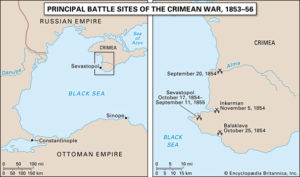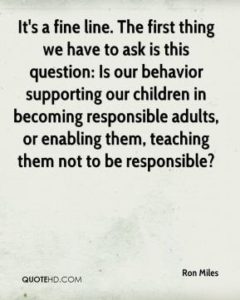A recent column elicited sufficient response—some of it arguably positive—that I’m going to pontificate for a few more paragraphs. Apparently how to support without enabling is a thing. Supportive versus enabling is used in the curriculum of addiction and recovery. But supportive versus enabling applies even more broadly to parenting: How can we tell when we’re not doing enough for our kids? How do we know to allow them to do for themselves?

Conflicting laments: 1) if I don’t do his homework for him, the homework won’t get done. 2) How will she ever learn to clean her room unless I force her to clean her room? Doing homework for kids is never a good idea. But force only teaches resentment. What is the middle path?

These questions are seldom considered: Is he grateful for homework help? Could he have completed the assignments alone? Kids who can, should. Kids who would fail without support should be scaffolded. Doing stuff for kids that they could do on their own infantilizes them, denies them the opportunity to accomplish and contribute. Insisting that good students be great fractures relationships. No good ever came of expecting more than is feasible. Expecting too little has predictable negative results as well.

Michael seems unable to write college admissions essays. Week after week he shows up to his meetings with his college counselor carrying blank pages and sorrowful eyes. Essays about the Crimean War come easily. But “Who are you?” insights required by admissions personnel do not. Clearly, it is appropriate to get him started on “if you could interview anyone living or dead, past or present, fictional or real, what questions would you ask that person and why?” Communicating, “sit there and write this stupid essay right now” was the right call. As evidenced by Michael’s subsequent success at Amherst undergrad, PhD at Carnegie Mellon, and awesome job at Google. I’m not claiming credit for any of that success although I am going to point out that I did suggest that Michael put a semi-colon in the third paragraph of his personal essay.

Laura arrives late for her tutoring lessons when she shows up at all. She is texting and distracted during her sessions, staring off into space, disrespectful. She refuses to do homework even with infinite patient guidance, preferring social media and video games. When she is motivated enough to speak she complains about her “idiot teachers.” Laura needs a reality check and some logical consequences more than she needs more payments to the tutor. “Helping” her with her academics is anything but.

How do we maximize the likelihood of having a Michael and avoiding a Laura? How do we get from here to there? Let’s begin in a slot canyon in Central Utah.

Three-year-old Jimmy’s plastic boots seem ill-suited for clambering over boulders many of which are bigger than he. Trickles of melted snow allow for squishy steps. Jimmy takes my hand when his footing is uncertain. When our path is blocked by three-foot rocks, Jimmy is given hand to hand from one sibling to the next. No instructions were articulated to his eight-year-old brother or his ten-year-old sister. They seamlessly passed Jimmy back and forth through gaps in the rocks. They carried him where a three-year-old could not negotiate the path. When Jimmy could make his way on his own, they let him slog along.

What could be a more appropriate metaphor for solid parenting? “Follow the child” Montessori said. Help him when he needs help, let him be when he doesn’t. At every age and stage communicate “we can work it out.” Or as Gabor Mate put it, “we’re in this together.”

Carrying the child the whole way through the canyon won’t convey, “you can do it.” Jimmy wouldn’t know what he was capable of if he hadn’t walked when he could. Yelling at the child—another popular parenting strategy—is also contraindicated. “Why can’t you get over these rocks? Your siblings don’t need to be carried. Why won’t you try harder?” Can you imagine more harmful remarks for a toddler? Yet “what’s wrong with you? Why aren’t you someone else?” is what children of all ages hear every day.

As is frequently the case, the middle path is preferred. Allow what you can, help if you must, respect in all cases–both in the canyon and in life.


